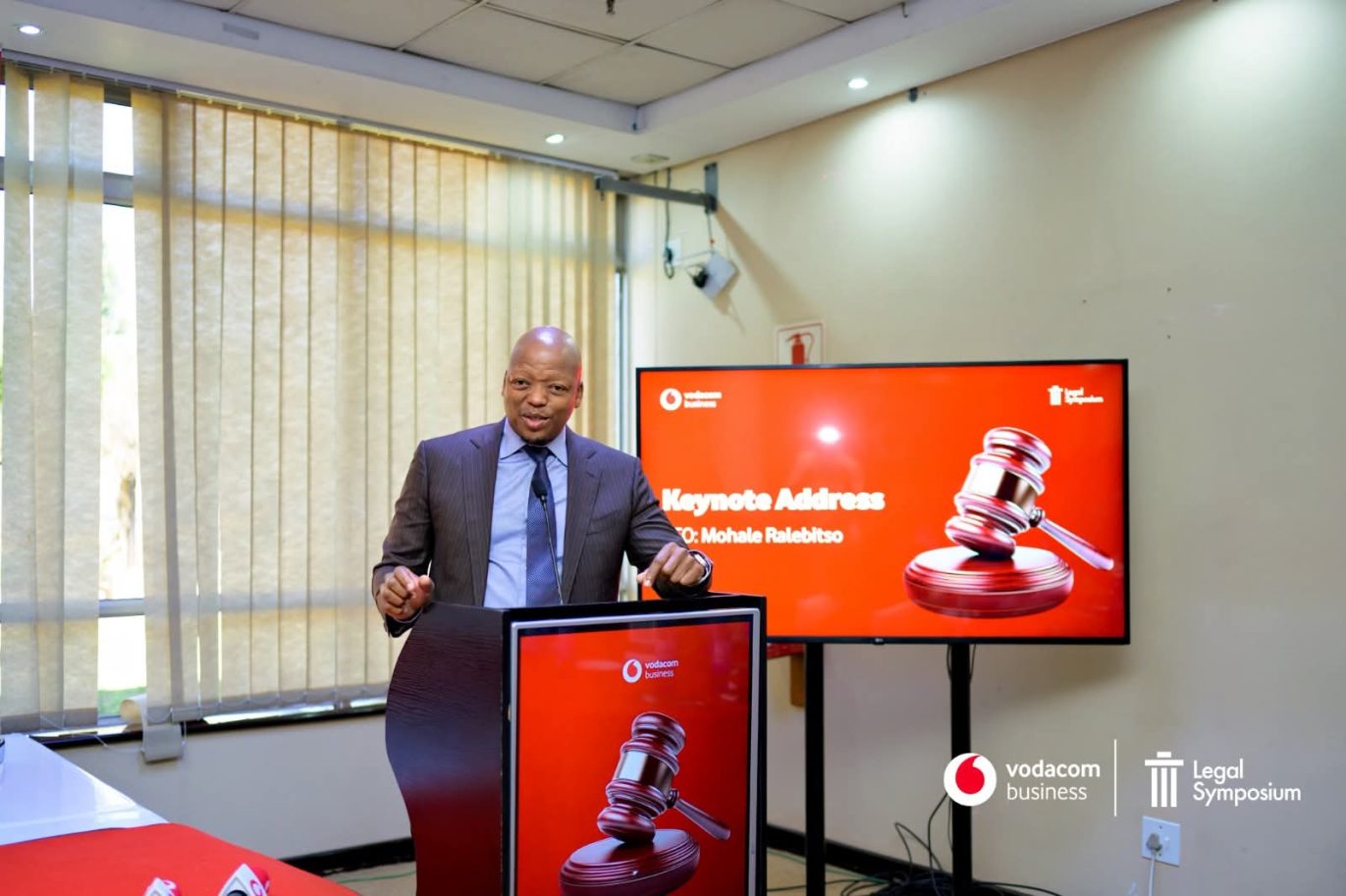
Vodacom Lesotho on Thursday hosted the Legal Symposium on Law and Technology in Maseru under the theme “Leading the Future – Our Shared Role in Legal Evolution.” The event brought together key figures from Lesotho’s legal and technology sectors to explore the country’s role in shaping a responsive and inclusive digital future.
Delivering the keynote address, Vodacom Lesotho Chief Executive Officer Mr. Mohale Ralebitso challenged participants to embrace authenticity and innovation within their local contexts. Quoting American philosopher Ralph Waldo Emerson, he said, “Envy is ignorance, imitation is suicide.” Ralebitso explained that envy blinds individuals to their own potential, while imitation erases their uniqueness — a reminder especially relevant to smaller nations like Lesotho, where people often underestimate their ability to create solutions rooted in their environment.
He urged legal practitioners and policymakers to become architects of Lesotho’s digital future, emphasising that while speed in innovation is important, direction and accountability are equally crucial. “A powerful engine needs brakes,” he remarked, stressing the importance of thoughtful regulation in emerging areas such as artificial intelligence and intellectual property. Ralebitso further called for inclusive legal frameworks that protect vulnerable populations and reflect Lesotho’s social and economic realities. He underscored the need for academic reform and digital literacy to prepare future legal professionals for the demands of a modern, technology-driven world. Importantly, he emphasised that transformation must be inclusive, of quality, and rooted in purpose, ensuring that no one — particularly rural communities — is left behind.
Speaking at the same event, the President of the Law Society of Lesotho, Lintle Tuke, reflected on the country’s longstanding traditions of conflict resolution, noting that Basotho practiced Khotla long before modern Alternative Dispute Resolution (ADR) systems were introduced. He announced that the Law Society will soon sign a Memorandum of Understanding on arbitration with the Arbitration Foundation of Southern Africa (AFSA) under the umbrella of the SADC Lawyers’ Association (SADC-LA), to strengthen cross-border collaboration in dispute resolution. “When society moves into chaos — whether by sword or by software — people look to lawyers as the first line of defence,” he said. “For our country to thrive, accountability and responsibility must guide us. As we embrace new technologies, we must also protect the profession that defends justice.”
Tuke observed that technology in the Fourth Industrial Revolution is reshaping industries globally, yet progress within the legal system remains slow. One attorney shared a practical example, explaining that they had once encountered a case where a WhatsApp message was regarded as inadmissible in court, highlighting the urgent need to align legal practices with digital realities.
The symposium also discussed the significance of ADR in humanising justice. Participants noted that while courtrooms can be rigid and emotionally detached, ADR introduces a human element, allowing both parties to participate in resolving disputes in a more collaborative and comfortable environment. It was explained that ADR — sometimes referred to as “Appropriate Dispute Resolution” — can often be the best route to fair outcomes, through methods such as mediation, negotiation, or arbitration.
Adding a regional perspective, Advocate Motebang Ramaili, a legal practitioner in both South Africa and Lesotho, shared experiences from South Africa’s adoption of digital case management systems. He explained that the “Court Online” and “Case Lines” platforms enable electronic filing of cases, allowing attorneys to upload documents digitally. When a matter is ready for trial, it transitions to Case Lines, a centralised database used by the courts. Ramaili encouraged Lesotho to consider similar innovations to enhance efficiency and accessibility within its legal system.
Nthabiseng Pule, Technical Special Advisor to the Ministry of Communications, Science, Technology and Innovation under UNDP, stressed the importance of evidence-based policy development and multi-stakeholder collaboration. She outlined key stages of the policy process — problem identification, agenda setting, policy formulation, decision-making, implementation, monitoring, evaluation, and feedback — noting that each stage requires both government leadership and private sector support. Pule highlighted that lack of funds is not always the barrier to progress. “Sometimes, it’s not about financial resources. The government may lack expertise in certain areas — and that’s where private sector involvement and joint effort can make the difference,” she said.
As the discussions concluded, a shared sentiment emerged that Lesotho’s legal community must adapt and innovate rather than imitate. The country’s path toward a digital legal future will depend on collaboration, capacity-building, and the courage to lead with identity and purpose. The symposium reinforced a powerful warning: modern colonisation will not come with guns, but through systems and technologies — and only those prepared and informed will thrive.




